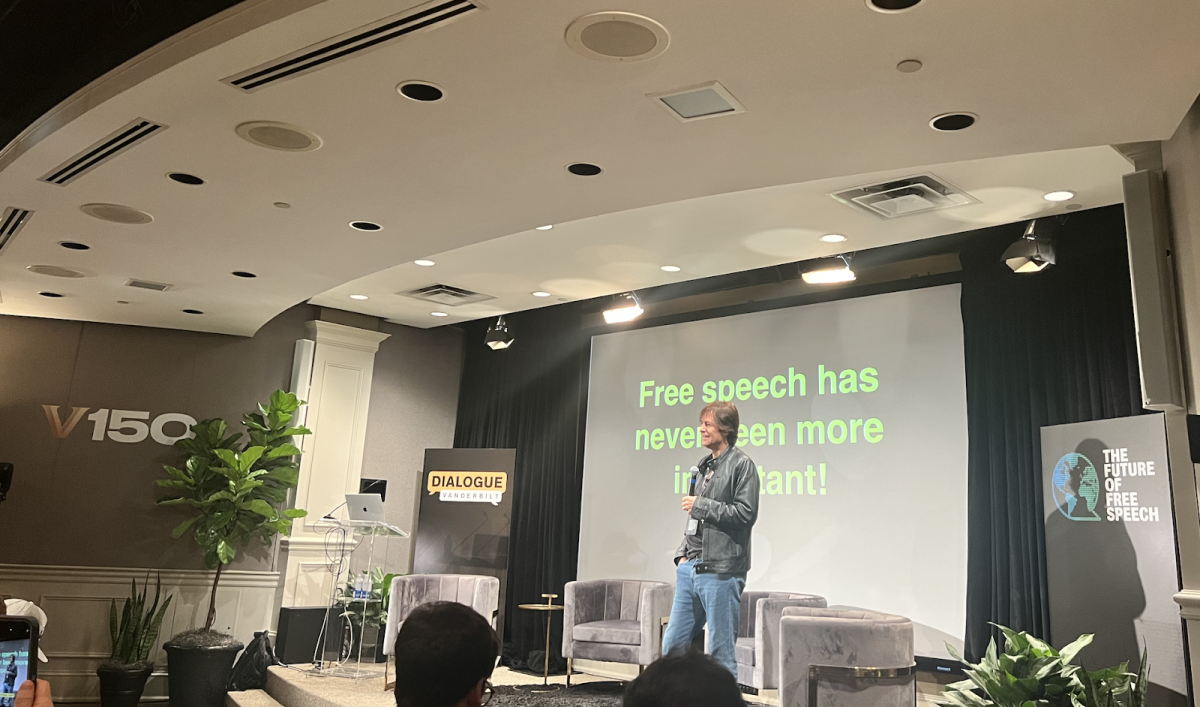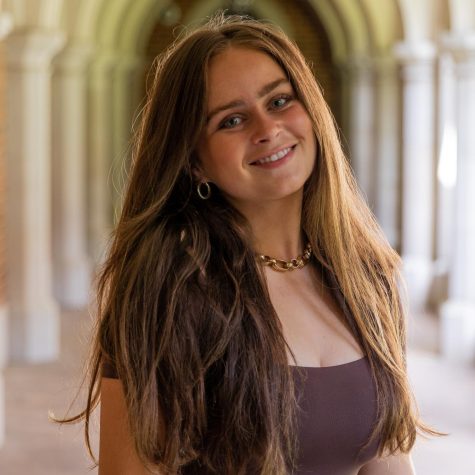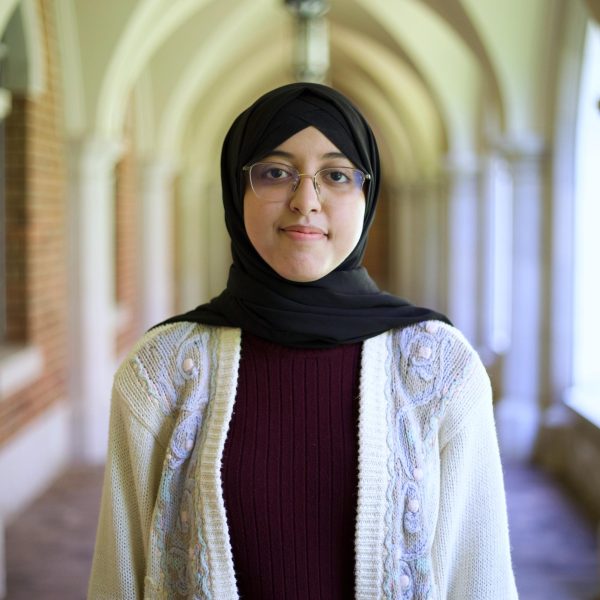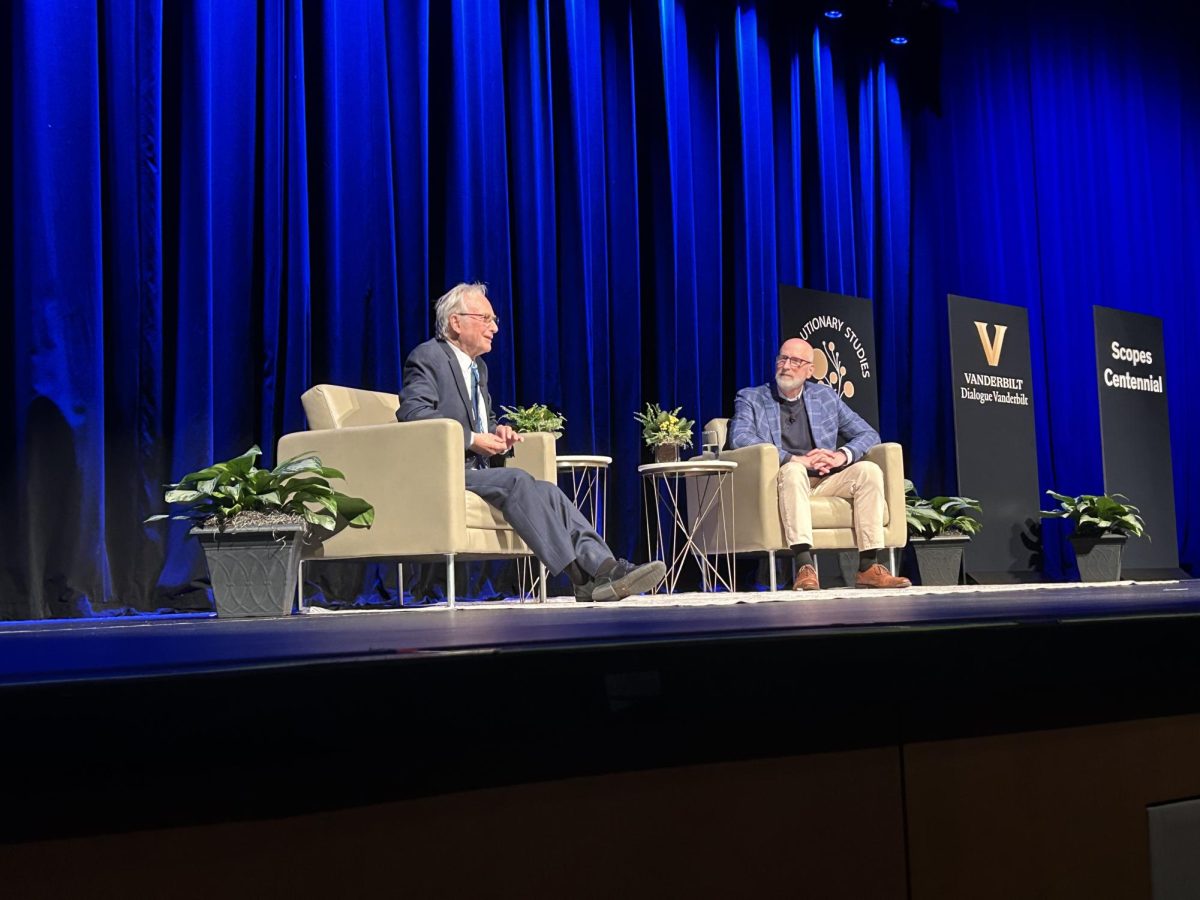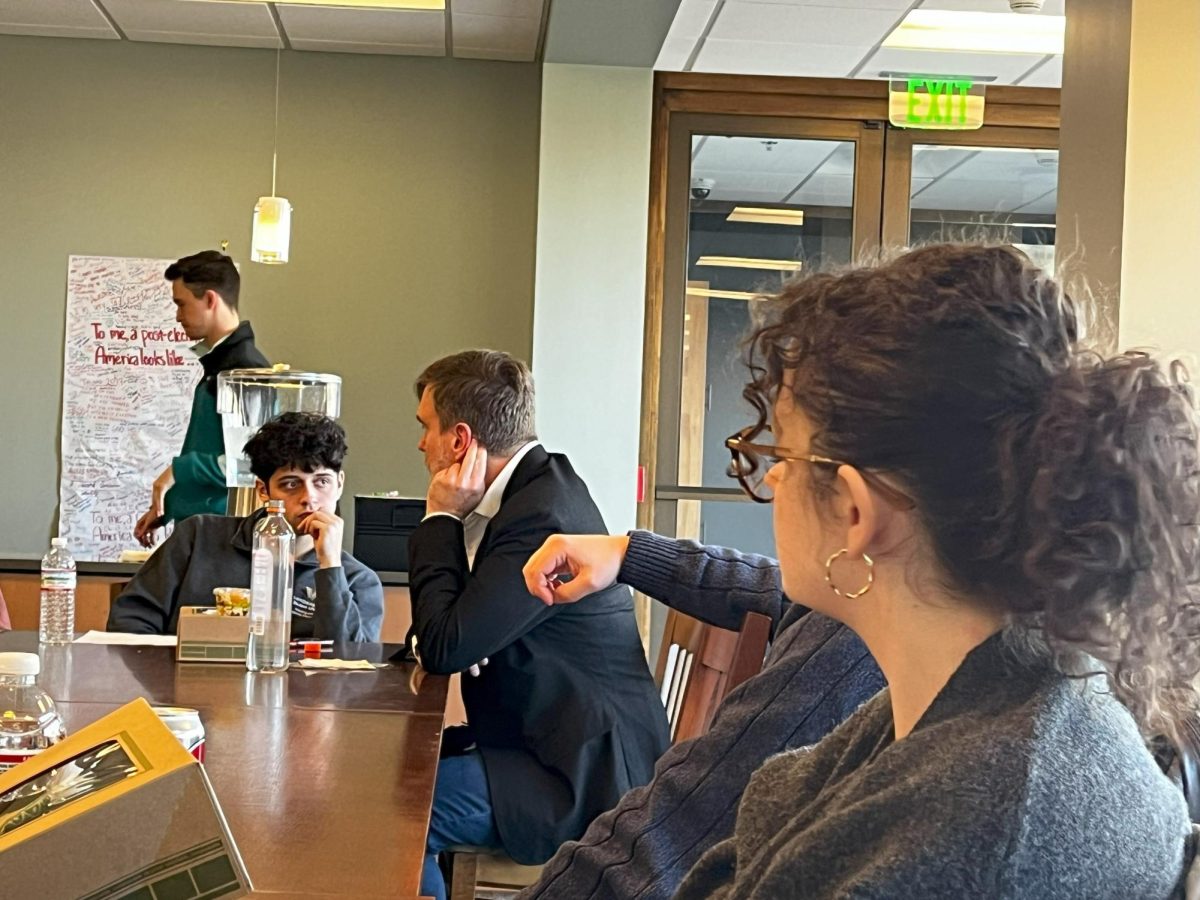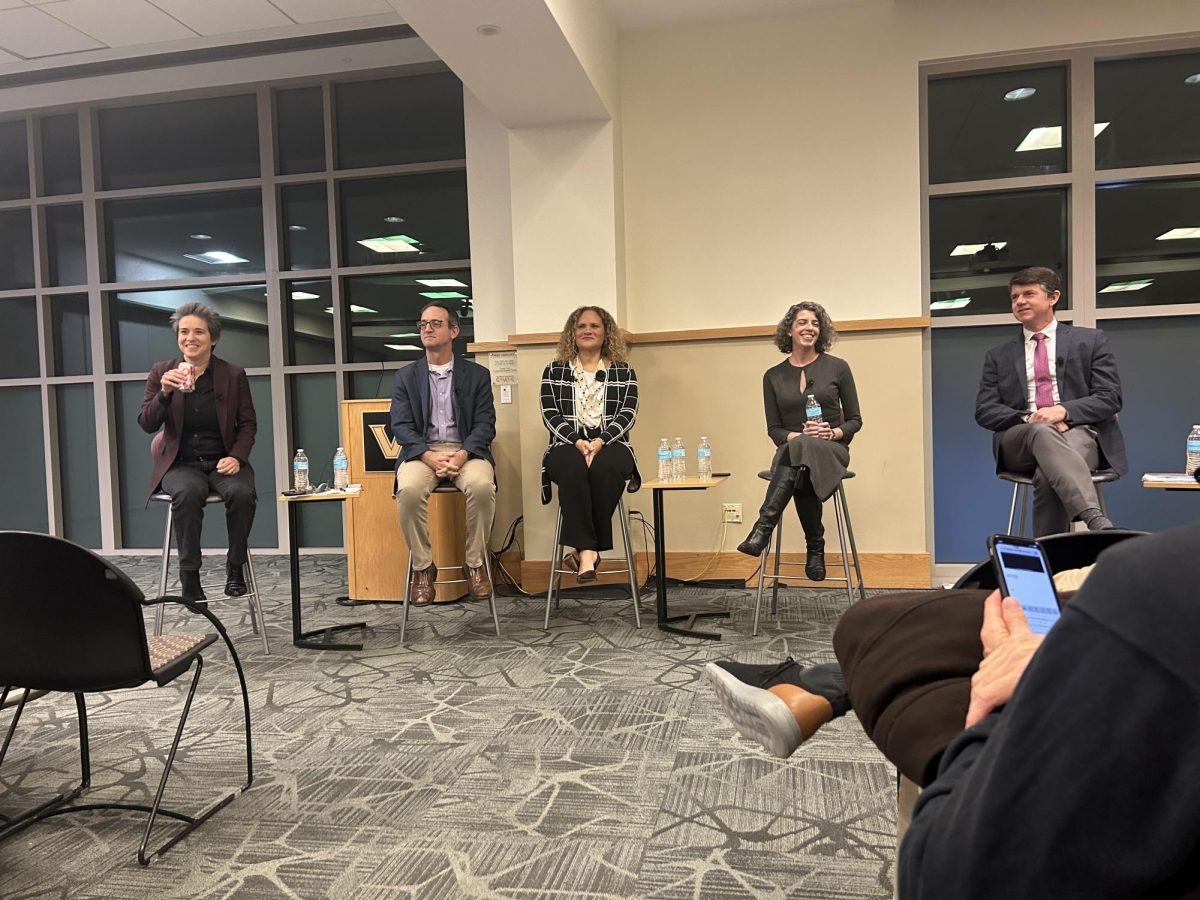Vanderbilt hosted the inaugural Free Speech Week from Oct. 10-17 as part of the ongoing Dialogue Vanderbilt initiative. The week’s events featured visits from New York Times columnist Bret Stephens and 2022 MacArthur Fellow Jennifer Carlson, as well as a symposium on AI, free speech and human rights.
Carlson, a sociology professor at Arizona State University, spoke on Oct. 10 about the national gun debate, including her own research on the subject. Bret Stephens, also a senior contributor to NBC News, joined Samar Ali, professor of political science and law research at Vanderbilt, on Oct. 16 for a discussion on contemporary free expression and civil discourse.
Chancellor’s Lecture on Free Speech
During the Chancellor’s Lecture on Free Speech hosted by Chancellor Daniel Diermeier, Stephens pointed to his shifting perspectives on climate change as evidence for the importance of open-mindedness. After publishing an article in 2017 calling climate activists’ alarmism unwarranted, Stephens said he was invited by a climate scientist to travel to Greenland to directly witness the impact of carbon dioxide production on its ice sheets. The experience compelled him to reverse his stance on climate change, with his subsequent column acknowledging the phenomenon as “real.”
“With this story, Stephens presented the audience with a simple yet powerful takeaway: knowledge is the foundation of judgment, and in a world of contagious misinformation, we should all strive to find the facts before making decisions,” first-year Jason Vadnos, an Open Dialogue student ambassador, told The Hustler.
Stephens made headlines earlier this year when University of Chicago students protested his selection as the 2023 Class Day speaker. He responded by calling the allegations “cherry-picked” and misrepresentative. Vadnos said he believes that the university’s decision to invite Stephens for Free Speech Week directly aligns with its commitment to “free and open exchange of ideas.”
“We live in a time of deep political and ideological division, and the easy choice for our administration is to simply listen to the voice of the masses,” Vadnos said. “However, by bringing a speaker to campus who might be seen as controversial or unrepresentative, Vanderbilt is staying true to the principles of free expression it was founded on, and encouraging its students to learn and grow from others’ ideas rather than silencing them.”
Symposium on AI, Free Speech and Human Rights
The Future of Free Speech Project and Vanderbilt hosted the week’s hallmark event — the Symposium on AI, Free Speech and Human Rights — on Oct. 12 and 13 at the John Seigenthaler Center. The Future of Free Speech Project is a nonpartisan organization founded by Justitia, Denmark’s first judicial think tank, and aims to promote free speech on a global scale through knowledge, research and advocacy. On April 1, the Future of Free Speech Project opened a U.S. location at Vanderbilt.
The two-day symposium included a keynote address, presentations from Open AI and the Vanderbilt Data Science Institute and five panel discussions. The events were also livestreamed.
The symposium began with a welcome and introduction from Jacob Mchangama, Executive Director of The Future of Free Speech project. He introduced the mission of the symposium and presented a series of legal, technological and ethical questions related to AI that would be discussed by expert panelists.
“Very often when we look back, we tend to think, or I hope many of us think, that the printing press was good, that the radio was good, and so on,” Mchangama said. “But AI may be a different category altogether. It might be the first time in human history that new communications technology does not depend or at least depends very little on human input.”
Having addressed widespread reservations surrounding generative AI, Mchangama concluded his welcome optimistically, highlighting the technology’s potential for positive change.
“Whatever the future of free speech in the age of AI, our best chance of making it one that benefits our species is to engage with these difficult issues head on, even if it’s difficult to come up with any set of definitive answers,” Mchangama said.
Mchangama then introduced Diermeier, who began his speech with an acknowledgement of the present urgency of this discussion in light of the Israel-Hamas war.
“At this university, we are committed to promoting and enhancing the much-needed debate and informed understanding that serves us as one of the great antidotes to hatred and violence,” Diermeier said. “We’re really taking a collaborative and cooperative approach that defines our culture. We call this radical collaboration, and we take this very seriously in our day-to-day work by bringing people from different perspectives together to think about the hard problems, such as AI.”
Following Diermeier’s address, the first panel explored the legal and ethical implications of AI within the context of the First Amendment and international human rights standards. Moderated by Mchangama, the panel included Alexandria Walden, Google Policy Lead for Global Human Rights and Free Expression; Eugene Volokh, professor at UCLA Law School; and Joan Barata, Justitia’s senior legal fellow.
The next day’s keynote address was delivered by Max Tegmark, professor of physics at MIT. As part of the Institute for Artificial Intelligence and Fundamental Interactions and the Center for Brains, Minds and Machines, Tegmark led an interactive presentation addressing pressing issues connected to AI’s rapid growth.
“It should be a human right to know if you are interacting with a human being or not,” Tegmark said on legally mandating generative AI.
Tegmark also discussed his Improve The News Foundation, a daily news publication he founded in 2020 that he claims provides readers with various perspectives and important facts for every significant news story in the United States’ news cycle. He ended his address by reaffirming the importance of free speech in a world threatened by censorship and propaganda.
“The lesson here is never give any powerful authorities, governments, big companies any special influence over fact-checking,” Tegmark said. “This is lesson number one from science. Science is very humble; science is very, very ruthlessly democratic. In science, trust is earned.”
The symposium is one of many projects that have resulted from the partnership between Vanderbilt and the Future of Free Speech Project. Others include the “Freequalizer,” an AI-powered toolkit being worked on in the data science department that, according to Mchangama, aims to combat hate speech.
“We’re delighted, first of all, to be on campus since April…The Future of Free Speech Project is an independent entity, but I think we have a very, very strong collaboration [with Vanderbilt],” Mchangama said in an interview with The Hustler.
Mchangama also encouraged students to engage with campus resources to become more involved in the legal and ethical discussion of generative AI.
“[In addition to] playing around with various AI systems, [undergraduate students] should follow conferences like the one we’re having today, looking up some of the speakers and experts that we have who have written about some of the thorny issues,” Mchangama said. “I think this is a way forward.

